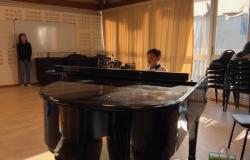For an exceptional session, the House of Representatives welcomed, this Wednesday, November 20, the members of the children’s parliament. Young parliamentarians took the floor to ask direct questions of ministers, addressing crucial topics such as education, mental health, culture and language, highlighting concerns of younger generations.
The session, which was held within the framework of the 2023/2025 mandate of the Children’s Parliament, was distinguished by the firmness and relevance of the questions asked by the young deputies. The latter, decisive and incisive, did not hesitate to confront the ministers on vital social issues, while highlighting their demand for fair treatment and respect for constitutional principles, in particular the official language of the country.
One of the most striking questions of the session was raised by Houria Selmali, a young parliamentarian, who questioned the Minister of National Education, Mohamed Saad Berrada, on the inequalities in the implementation of pioneering schools. According to her, this experience is not yet generalized to all public schools, thus creating a gap between establishments benefiting from the program and those which are deprived of it.
« There are disparities between schools called pioneers and those that remain on the sidelines. This prevents true equality of opportunity for Moroccan students“, she said. The minister responded by promising that “ within three years, these schools will be generalized at the national levell”, while insisting on the fact that this generalization will be made “ in the best conditions and without haste« .
The child parliamentarians also addressed the issue of mental health, a thorny subject but of capital importance in the school context. The MP, Malak El Omari, questioned the Minister of Health, Amine Tahraoui, about the government’s efforts to raise awareness of the importance of children’s mental health and their psychological well-being.
« Morocco, under royal protection, is one of the countries most committed to respecting children’s rights, particularly in terms of health and education.“, affirmed the minister, recalling that the country is implementing numerous initiatives to support children and adolescents in their psychological development.
He notably mentioned the national mental health program, which includes specialized consultations in child psychiatry in primary care, as well as training centers and dedicated services in several hospitals.
Another point which was the subject of lively debates during this session was the use of the French language by certain ministers, despite the constitution which stipulates that Arabic and Amazigh are the only official languages of the country. A fervent defender of linguistic integrity, the young MP reacted strongly by emphasizing the importance of respecting this constitutional provision.
The Minister of Economic Integration, Younes Skouri, responded by recognizing the importance of the Arabic language in official exchanges, but justified the use of certain technical terms in foreign languages, notably French, by the specialized nature of these terms. “ You are right to remind us of the importance of speaking in Arabic, but sometimes it is necessary to use technical terms in other languages”he explained.
The question of Moroccan culture was also at the center of the concerns of young parliamentarians. Mohammed Mehdi Bensaid, Minister of Culture, answered questions regarding the digitalization of culture and initiatives aimed at promoting Moroccan heritage among young people, particularly those living abroad.
He explained that technology plays a crucial role in the dissemination of Morocco’s tangible and intangible heritage, specifying that numerous initiatives have been launched to raise awareness among Moroccan youth, particularly those in the diaspora, of the richness and diversity of the national culture.
More than a space for dialogue between young parliamentarians and government officials, this session also served to highlight the importance of youth participation in decision-making processes.





